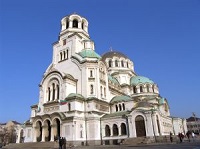For most people, Bulgaria isn’t the most well-known of countries. Needless to say, this is not because the country lacks natural beauty, history, culture, industry, or infrastructure. The Republic of Bulgaria, as it is officially known, is a thriving, modern, democratic country in south-eastern Europe, and if this is to be your home for a few years, there is plenty for you to look forward to.
When it comes to religion, Bulgaria is similar to most other European countries – Christianity is the main religion, there is a significant Muslim population, and other smaller groups make up the remainder of the population.The country’s constitution guarantees religious freedom, although it also designates Orthodox Christianity as the “traditional religion”, which, among other things, means that it does not need to register in court – a requirement for all other religions. During communism, all religion tended to be suppressed, although the Bulgarian Orthodox church was so embedded in Bulgarian culture that the authorities could only sideline it rather than completely suppress it. Today however, restrictions on religious freedom, religious discrimination, and general religious tension are low in Bulgaria. In fact the capital city of Sofia is home to the medieval St Nedelya Church, the 16th century Banya Bashi Mosque, and the more recent Sofia Synagogue, all within a stone’s throw of each other.
Christianity
An estimated 80% of Bulgaria’s population is Christian, and 75% of the total population follows Eastern Orthodox Christianity, specifically the Bulgarian Orthodox Church. Ethnic Bulgarians, the ethnic majority in the country, make up the majority of the Bulgarian Church’s followers. There are smaller groups of Russian Orthodox, Greek Orthodox, Ukrainian Orthodox, and Romanian Orthodox Christians, and there are also Roman Catholics, Greek Catholics, and various Protestant sects.
The roots of Christianity in Bulgaria go all the way back to the first century, although the church was formally established only much later. The Bulgarian Orthodox Church is one of the oldest churches in the world, and is in fact the oldest of the Slavic Orthodox churches, with a strong influence on Orthodox Christianity throughout the world. Roman Catholicism came considerably later, in around the 8th century, and Protestantism is a relatively new development, coming in as late as the 19th century, and was primarily the result of American missionary activities.
Islam
After Bulgarian Orthodox Christians, Sunni Muslims form the largest group of believers in Bulgaria. Islam in Bulgaria goes back to the invasion of the Ottoman Turks in around the 14th century, when many Bulgarians converted either for convenience or to avoid persecution. As a result, the attitude to Islam has been complex and sometimes difficult. On the other hand, Bulgaria is also home to the unique and very interesting Kuzulbashi sect, a Shia sect that has incorporated several Orthodox elements and customs such as confession and communion. In addition, even among Sunni Muslims, many could be described as secular or even non-practicing – many do not pray, and most reject the veil.
Atheism
Like much of the rest of Europe, Bulgaria has a large population of atheists, agnostics, and others who do not follow any formal religion. In the 2011 census, 11.8% of the population said they did not identify with any religion, and according to some sources, atheists make up the majority of this group. According to others, atheists are in fact the single largest group after Orthodox Christians, with some estimates going all the way up to 30% of the population.
Judaism
Judaism too has a rather complex history in Bulgaria. In World War II, Bulgaria sided with Germany, but avoided deporting its Jews to concentration camps. In spite of this, somewhat understandably, most of the Jewish population (90% by some estimates) left for Israel after the war. Later, under Communism, Jews were treated not as a religious group, but as an ethnic group. The Jewish population in Bulgaria today is mostly secular and non-practicing, and even though they have long been a very small minority, they have been incredibly influential on Bulgarian culture.
Other religions
Bulgaria also has a small percentage of people belonging to other religions, of which the notable ones include Buddhists and traditional folk beliefs of the Romani gypsies.

